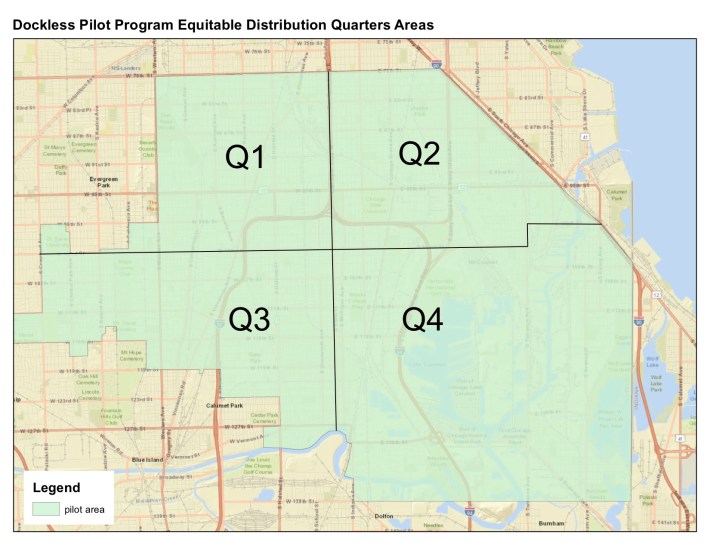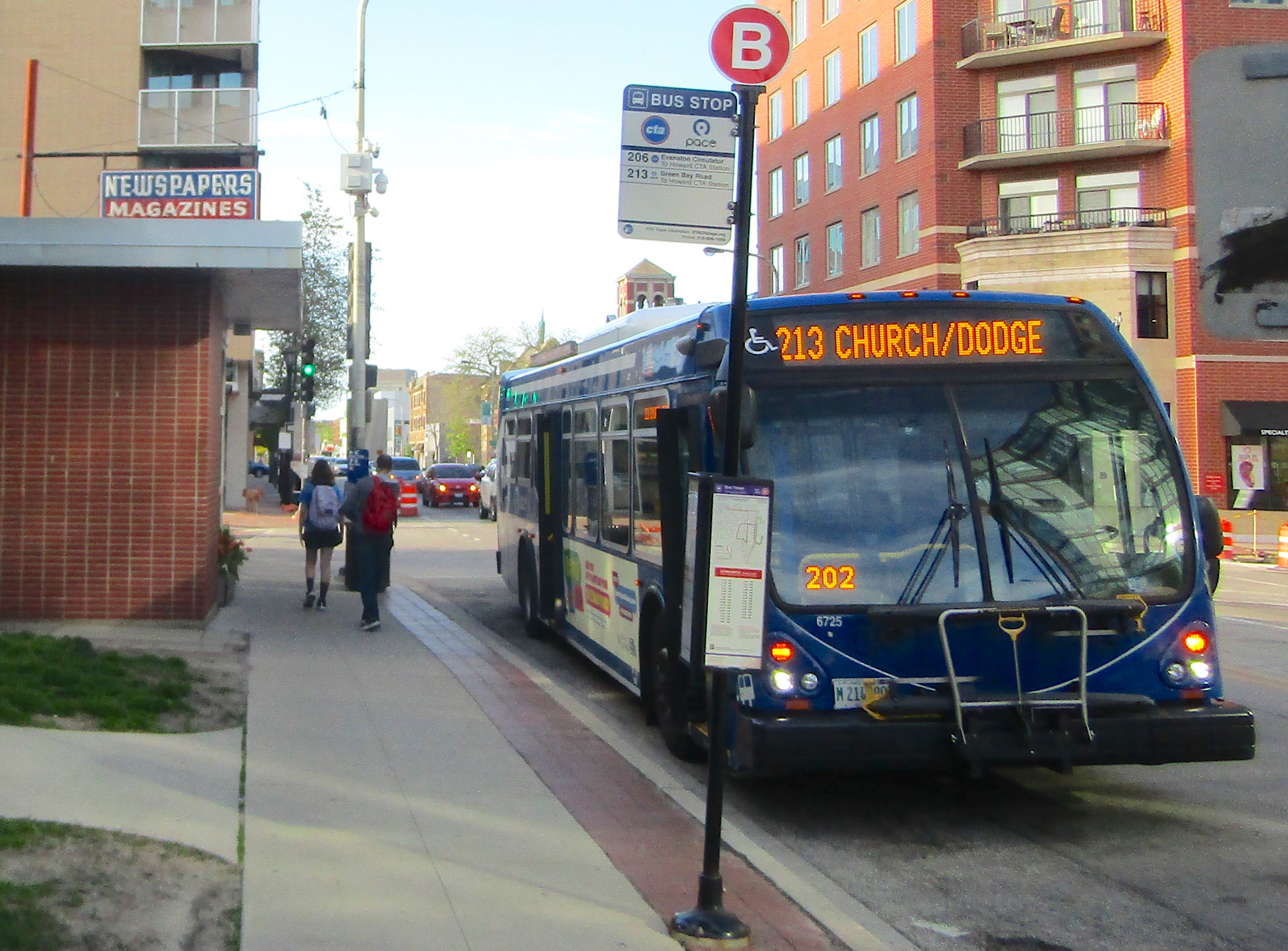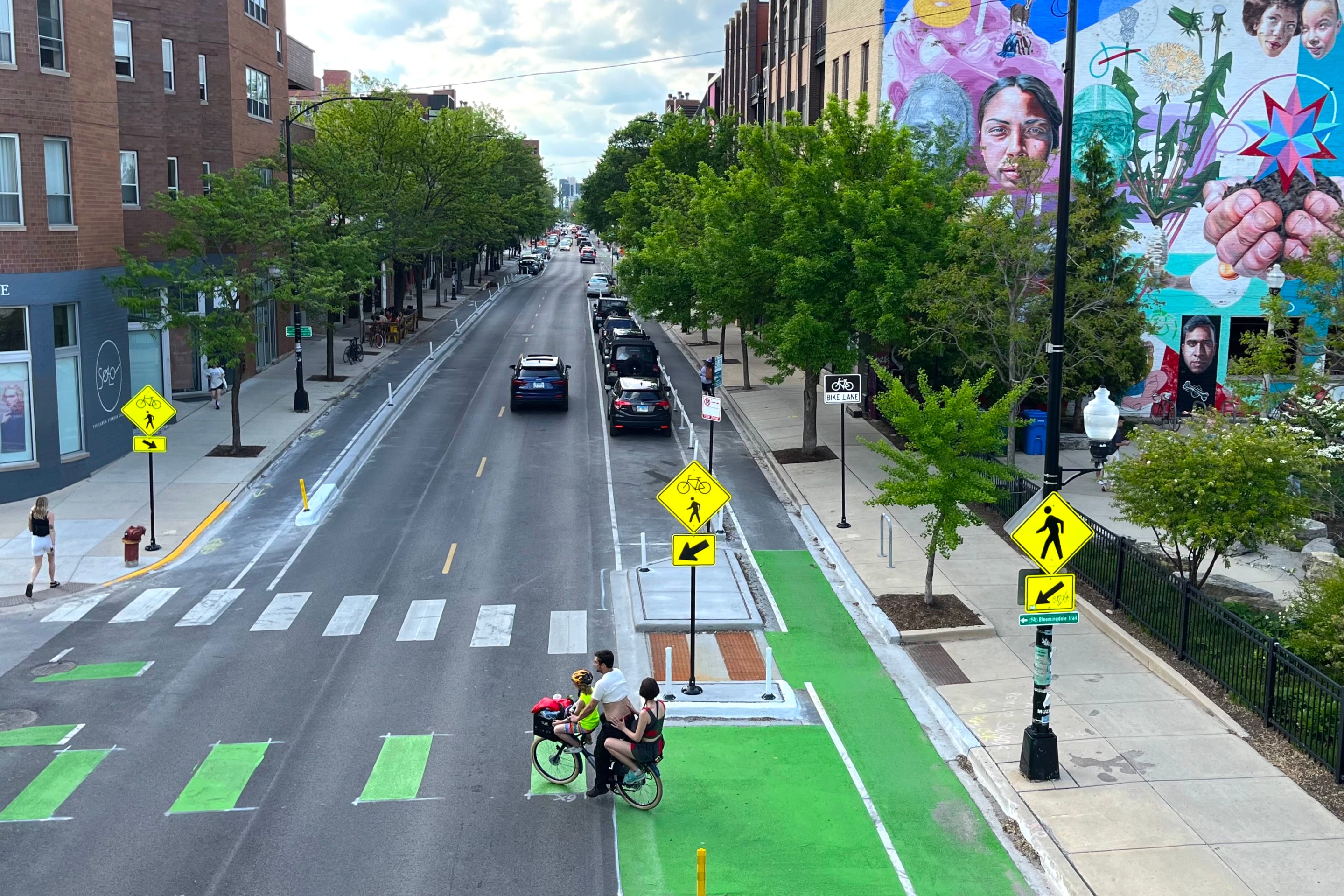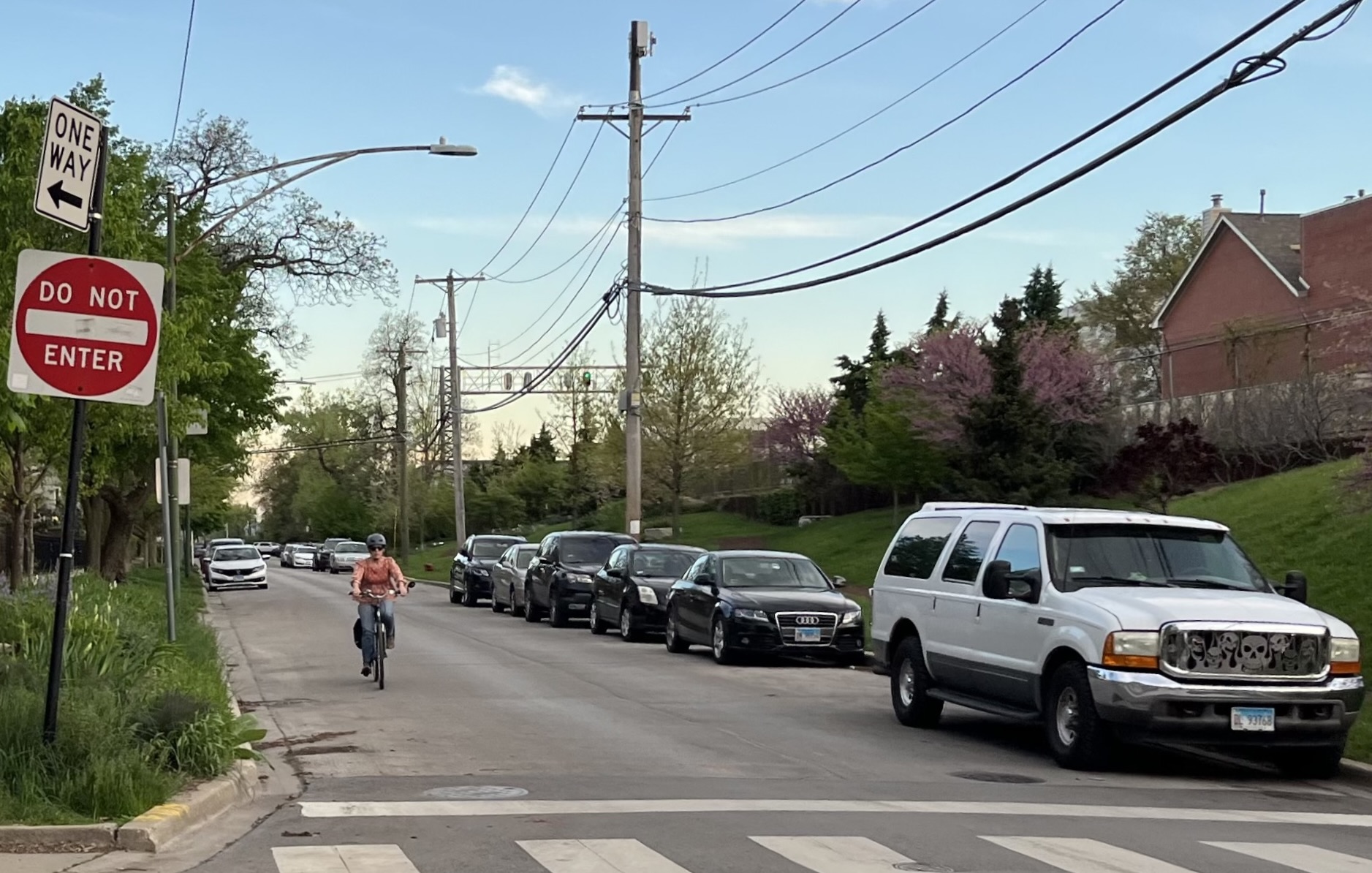Dockless Bike-Share Policy Experts Discuss the Pros and Cons of Chicago’s Rules
9:47 PM CDT on April 30, 2018

Riding a Jump Mobility dockless bike-share cycle in the South Loop. Photo: John Greenfield
Earlier this month Streetsblog Chicago reported on a new study of dockless bike-share regulation best practices by by Brandon Bordenkircher and Riley L. O’Neil from Twelve Tone Consulting, a local government affairs consulting company. Since a DoBi pilot is slated to launch tomorrow on the Far South Side, we asked Bordenkircher and O'Neil to check out the city of Chicago's permitting regulations for the vendors and offer their analysis of the rules. -JG
May 2018 is an exciting time for transportation in Chicago. Not only is Divvy offering a free day of rides thanks to Switzerland’s tourism office, but the city of Chicago is also launching their dockless bike-share pilot. Chicago released its dockless vendor permitting requirements last week, which you can read here, and LimeBike, and possibly other vendors, will be launching fleets tomorrow. While many large cities have been approving DoBi systems over the past year, Chicago has so far taken a wait-and-see approach in order to create a dockless pilot that’s a good fit for our city, and we believe the city has done just that.
There are things we love about the pilot and things we had questions about. So here’s a rundown of the parts that jumped out at us:
NABSA Member in Good Standing (or a comparable bike-share association)
At first glance, it looked as though the Beijing-based DoBi company Ofo might not be able to operate in the Chicago due to their expulsion from the North American Bikeshare Association for lobbying for a statewide bill in Florida that would have blocked local municipalities from regulating dockless technology. However, since the pilot states that a vendor needs to be a member of NABSA or “a comparable bikeshare association” Ofo will be able to participate in the Chicago pilot because it belongs to an organization called BikePlus. No matter where you stand on Ofo’s lobbying efforts, there is no denying that Ofo is trying to be a good actor in Chicago by providing cycles for a new low-tech "bike library" that will be launching on the Far South Side this spring.
Fleet Size
Vendors are allowed to have up 250 bikes each, and they are required to declare the total number of bikes they intend to launch in their permit application. Limiting vendors to 250 bikes is a good idea -- it’s not too conservative and it won’t cut into Divvy’s ridership. Chicago is using a fleet-phasing strategy, allowing vendors to deploy 50 wheel-lock-only ("free-floating") bikes from May 1st to June 30th, and up to 250 "lock-to" bikes (with built-in U-locks or cable locks for securing the cycles to a fixed object) through the end of the pilot on November 1st.
Why allow vendors to start with with 50 free-floating bikes from May 1st to June 30, but ban those cycles on July 1? We understand that the city is pushing for lock-to tech because of issues of bikes in trees, rivers, and blocking sidewalks, but why not allow the vendors to keep 50 wheel-lock bikes active during the entirety of the pilot if everything is going well?
The only dockless vendors that we're aware of with lock-to bikes are Zagster (cables) and Jump (U-Locks). LimeBike, which appears to be the only operator that CDOT has approved to launch tomorrow, currently uses free-floating bikes, so they'll have to retrofit their cycles or have new ones manufactured in order to meet the lock-to requirement two months from now.
Parking
Chicago is requiring the companies to use geofencing to ensure bikes are not unlocked outside of the “Pilot Area.” Riders will be able to end their ride outside of the Pilot Area, but won't be able to unlock cycles outside the “Pilot Area.” This is a good idea.
The rules also note that it's legal to secure lock-to bikes to public bike racks, retired parking meters, and street signs. It's worth noting that this could conceivably create a bike parking crunch in some higher-traffic areas. For many years CDOT installed at least 500 bike racks a year, but it appears that the department installed zero racks in 2017.
Operations and Maintenance
The permit application fee of $250, and a $50 per bike administrative fee to address costs incurred by the city during the pilot, are reasonable fees that will protect the city financially in case any costs are incurred by the city in dealing with dockless issues. In addition, requiring vendors to move any bikes not parked lawfully within 2 hours of being reported, 24 hours a day, 7 days a week is a high standard that all cities should mandate.
Chicago has also done a good job with setting operations and maintenance standards. Many city permits have similar requirements for the dockless bike fleets, but they're not as detailed as Chicago's. As cycling enthusiasts, we’re impressed by the details of this document as they will help that each citizen that hops on a dockless bike will have a safe and enjoyable ride. The city requires each vendor perform 18 bike maintenance steps once a month on each bike in each fleet. This includes checking the brakes, seat posts, tire pressure (if applicable), and "trueness" of the wheels.

Rebalancing
The permit requires that the bikes be "rebalanced" every day. Also, the rules mandate that bikes parked outside of the Pilot Area be picked up and put back within the geofence within 2 hours, 24-7.
15 percent of a vendor’s fleet must be available in each quadrant of the pilot service area at any given time, according to the attached Equitable Distribution Map. The four quarters are mostly defined by State Street and 103rd Street. Vendors with 50 bikes have to provide at least seven bikes in each quadrant, and operators with 250 will need at least 37 bikes per quadrant.
Equity Requirement
When you look at any map of bike infrastructure, transit, or almost other public amenity, it’s obvious that the Far South Side is underserved. The dockless bike-share Pilot Area will serve neighborhoods that mostly lack Divvy access. (There are 14 Divvy stations within the DoBi zone between 79th and 87th. We believe the two modes will work together to better serve biking on the South Side.
ADA Adherence
Vendors are required to meet with the Mayor’s Office for People with Disabilities to every month to report on issues affecting people with disabilities, including sharing data on the number of complaints of public right of way obstructions. This is a great strategy -- we believe MOPD will have great insights about how best to serve all communities affected by dockless-related issues. Thier ideas should be shared with other cities. We wonder though, will vendors ever provide adaptive bikes for Chicago riders with disabilities?
Non-Smartphone Option / Hiring Practices
To make dockless bike-share equitable, the city is requiring vendors to provide a plan for providing access to residents with financial technological barriers to using their systems. Having non-smartphone and cash payment options is a great idea.
Vendors are also encouraged to hire local residents in communities that have been historically disadvantaged. Hiring citizens from these communities and teaching them to rebalance bikes or training them to be bike mechanics is a great idea, and it's something other cities should encourage as well.
Contact Info on Bikes
The permitting requirement dictate that all bicycles have easily visible contact information with a toll-free phone number with a 24-7 customer support hotline in English, with translation services available for Spanish, Polish, Korean, Arabic, Hindi and Mandarin. This contact info will come in handy when there are issues with improper parking or vandalism.
Data Sharing
During the pilot, vendors must submit anonymized dockless data to CDOT on the first of every month, beginning on June 1. Data sharing is a must, but as technology progresses, CDOT should consider requiring real-time data sharing. Data categories include includes bike maintenance data, bike availability, rider demographics, violation data, gyroscope data, and trip data. The trip and gyroscope data will tell the story of Chicago’s streets, since the latter feature can detect bumps in the road and suggest where CDOT can improve popular cycling corridors. Currently the only DoBI provider with gyroscope tech is LimeBike.
Chicago Sets the Pace Moving Forward
Arguably the rules place burdensome restrictions on vendors like LimeBike and Ofo due to their lack of lock-to tech, but on a whole the program is a great first step. Chicago has made strides towards bicycling in the past few years and this is reflected in the fact that the city has crafted one of the most well-thought-out dockless bike pilots yet.
Stay in touch
Sign up for our free newsletter
More from Streetsblog Chicago
Since COVID, Pace ridership has fared better on major corridors and in north, northwest suburbs than in south, west ‘burbs
The suburban bus system's top five busiest routes largely maintained their ridership rankings.
Due to incredible support from readers like you, we’ve surpassed our 2023-24 fundraising goal
Once again, the generosity of walk/bike/transit boosters is fueling our reporting and advocacy.
Which Metra corridor would become more bike-friendly and greener under a new plan? Ravenswood!
Thanks to plans to convert little-used parking spaces, the avenue is slated to get a new bike lane, and the Winnslie Parkway path and garden will be extended south.



